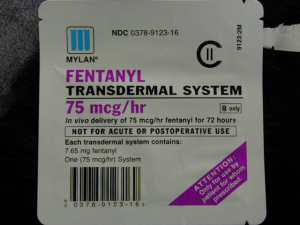DEA releases alert due to spike in Fentanyl releated deaths
Every so often a drug unexpectedly breaks of from the pack and begins to take a larger than usual toll on users. While some of these drug break outs can be attributed to larger social trends like the popularity of Molly (MDMA) in association with electronic music or “rave” dance parties some drug break outs are a bit more mysterious. Such is the latest outbreak of the use of Fentanyl, a legally prescribed super potent synthetic opioid pain-killer. The recent increase of use of Fentanyl is detectable by the number of bodies it leaves behind. On March 18th, the DEA released a nationwide alert to highlight the current trend.
Fentanyl is a legally prescribed drug and is 50 to 100 times more potent than morphine and 30 to 50 times more potent than heroin. Ingestion of small doses as small as 0.25 mg can be fatal. It can be easily absorbed through the skin often via transdermal patch
 Supervisors managing employees who perform safety sensitive duties in the workplace should be aware of this current trend.
Supervisors managing employees who perform safety sensitive duties in the workplace should be aware of this current trend.
Some alarming statistics release by the DEA on March 18th:
- “In the last two years, DEA has seen a significant resurgence in fentanyl-related seizures. According to the National Forensic Laboratory Information System (NFLIS), state and local labs reported 3,344 Fentanyl submissions in 2014, up from 942 in 2013.”
- Between 2005 and 2007, over 1,000 U.S. deaths were attributed to Fentanyl – many of which occurred in Chicago, Detroit, and Philadelphia.
- New Jersey saw a huge spike in Fentanyl deaths in 2014, reporting as many as 80 in the first six months of the fiscal year.
- Rhode Island and Pennsylvania have also seen huge increases since 2013. In a 15-month period, about 200 deaths were reported in Pennsylvania related to Fentanyl.
Opioids in the workplace
Although the above statistics are worrying, what’s unknown and probably more concerning in regards to workplace safety, are the unknown number of people who would presumably be taking Fentanyl on the job. All the ingredients that would make Fentanyl ideal for workplace abuse are there – legally obtainable via prescription, highly addictive, undetectable use (patch under clothing).
Supervisors operating within federally regulated drug testing programs and even those operating within drug free workplace programs who have the ability to order reasonable suspicion drug tests should be aware of the signs and symptoms of opioid abuse. In the workplace, it’s not important that supervisors identify the specific substance an employee might be abusing rather it’s important to immediately remove employees from performing safety sensitive duties who are exhibiting the signs and symptoms of potential drug use or abuse.
What to look for (common signs and symptoms of opioid use):
-
Drowsiness or nodding
- Constricted or pinpoint pupils
- Slurred speech
- Impaired attention or memory
- Depressed respiration
- Euphoria


